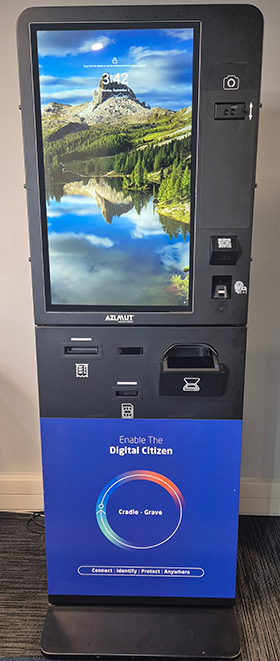

The digital age has ushered in unprecedented opportunities for governments worldwide to enhance service delivery, reduce bureaucratic inefficiencies, and fulfil the vision of e-government services. This creates a huge opportunity, for example, in South Africa, where the Department of Home Affairs issued 2,6 million smart ID cards against a target of 2,2 million in the 2022/23 financial year.
“At the heart of this transformation lies the use of biometrics-driven self-service infrastructure, a powerful tool that not only lightens the load on government service centres but also adds significant value through enhanced convenience, efficiency, and security,” says Grahame Saunders, GM Identity Management at NEC XON. One such application is identity document applications.
The shift to digital ID systems
Consider the state of government service delivery 10-15 years ago. If you needed a passport or an ID, the process was slow and labour-intensive, often taking weeks to verify fingerprints and photos before any further steps could be taken. Fast forward to today, and the contrast is striking. Now, fingerprint verification takes mere seconds, thanks to the integration of biometrics into government systems. The time saved is monumental, not just for the government, but also for the citizens applying for government services.
This shift to digital biometrics records marks a pivotal moment. “Once your biometric data is on record, the government not only recognises your existence, but also ensures that you are uniquely identified in both the public and (potentially) private sectors—eliminating issues like the duplication of ID documents, bank accounts, and social grants,” Saunders says. This digital format paves the way for the broader implementation of e-government services.

The role of self-service terminals
One of NEC XON’s solutions is the deployment of self-service terminals for e-government. These kiosks can identify individuals through fingerprints or facial recognition, confirming their identity and preventing ID theft. The real advantage of these self-service terminals is the potential to revolutionise the way government service centres operate.
Says Saunders: “Currently, citizens often need to visit government offices twice—once to apply and once to collect. However, with the introduction of remote technology like self-service kiosks or online applications, the need for the initial visit could be eliminated entirely.” This would halve the time spent in queues and reduce the burden on government offices, making the entire process more efficient and citizen-friendly.
Addressing security concerns
Of course, implementing digital ID systems and biometrics is not without its challenges, particularly regarding security. Data breaches are a legitimate concern, and there is a natural apprehension about handing over biometric data. At NEC XON, we use world-class solutions to ensure data security, with robust encryption and continuous vulnerability patching.
In South Africa, the adoption of biometric systems has actually made it more difficult to steal identities. Using biometrics significantly reduces the risk of ID theft, which is a major step forward in protecting citizens. However, we must remain vigilant, particularly with issues like the theft of infant identities—a problem that requires ongoing attention and innovation.
Expanding access to remote and underserved areas
A common challenge with digital ID systems is ensuring accessibility in remote or underserved areas. This is not a problem unique to South Africa, but it is one that can be effectively addressed with the right infrastructure. The ability to identify citizens through biometrics, regardless of their location, allows governments to deliver services more effectively, even in the most remote regions. Self-service kiosks and mobile service units can be deployed to bring these services directly to where they are needed most.
Moreover, with advancements in alternative energy sources and mobile communications infrastructure, such as NEC XON’s involvement with OneWeb satellite technology, the reach of digital ID systems can be extended even further.
The path forward: public-private partnerships
The successful deployment of digital ID systems requires collaboration between the public and private sectors. Public-private partnerships (PPPs) are crucial in bringing the necessary digital infrastructure to rural and remote areas, ensuring that these systems are inclusive and equitable for all citizens.
Globally, we have seen the successful implementation of e-passports, where biometrics are stored on microchips, marking an early step towards widespread digital ID adoption. As this technology continues to evolve, governments must work hand-in-hand with private sector partners to ensure that the benefits of digital ID systems are realised universally.
Biometrics-driven self-service infrastructure represents a significant leap forward in the evolution of e-government services. By reducing the load on government service centres and enhancing convenience, efficiency, and security, these systems have the potential to transform the way governments interact with their citizens. As we continue to innovate and collaborate, the future of government service delivery looks brighter than ever.
| Tel: | +27 11 237 4500 |
| Email: | [email protected] |
| www: | www.nec.xon.co.za |
| Articles: | More information and articles about NEC XON |
© Technews Publishing (Pty) Ltd. | All Rights Reserved.